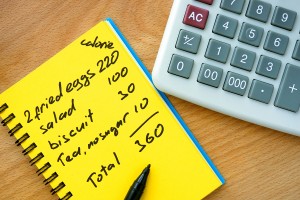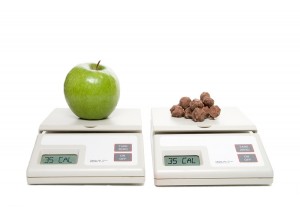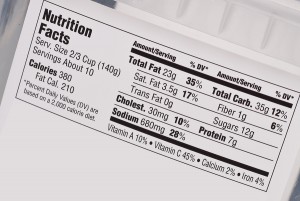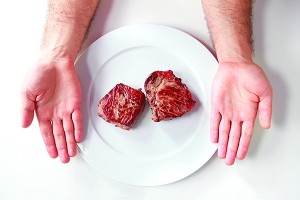Why You Shouldn’t Count Calories

I admit, I’ve totally changed my tune on the topic of calorie counting over the past few years. Back up to a few years ago and I would advise my clients that the best way to lose weight is to count calories, every day, all day. And while I agree that it is still a proven way to drop unwanted weight, let me share with you why it’s no longer the best way.
Just like everything else in life, common practices change and what was once thought to be the best way to achieve various results, is no longer the best way. And thank god for this, otherwise we would live in a world without change and mediocre results.
Enter calorie counting. As humans, we’ve been programmed to think in order to lose weight, we must cut calories and increase exercise. In other words, eat less and move more. And while this is completely accurate in most cases, it’s truly not that simple and here’s why:
A Calorie Isn’t Really a Calorie
Admittingly so, there are a lot of popular weight loss programs out there that focus solely on calorie tracking or a points system. While this may be great if someone is disciplined enough to eat a balanced diet full of fruits, vegetables, whole grain carbs and lean proteins, it doesn’t work well for average person.
Let’s take a look at a 100 calorie cookie and a 100 calorie small greek unflavored yogurt. They’re both 100 calories, right? Right. Here’s where the problem lies…a cookie is full of sugar and will spike glucose levels, resulting in increased insulin and fat storage. On the other hand, an unflavored greek yogurt is packed with protein and healthy fats designed to fuel the body appropriately while keeping blood sugars stable.

In theory, while 100 calories may be 100 calories, a cookie verses a yogurt is not the same fuel for the body, nor does it digest or store the same. And if a diet is purely based on counting calories or points, then a diet can ultimately be based upon unhealthy choices. While weight loss may occur while staying within a daily range of calories and eating noting but cookies, fries and pizza, so will muscle loss, energy loss and an overall decline in health and body composition. The final product (your body) is not the same.
Inaccuracies with Calorie Counting
Believe it or not, when it comes to food labels, there can be up to a 25% margin of error with what is reported on nutrition labels. This can happen due to incorrect labeling, laboratory errors and the difference in food quality and preparation.

So even if you are extremely diligent on your end with measuring and recording calories, there can still be up to a 25% error. If you’re trying to sustain 1,600 calories per day, your daily values could be off by up to 400 calories per day!
Not Realistic for Longterm Success
Have you ever tried to attend a company function and navigate how many calories are on your dinner plate? Or how about trying to figure out the contents of a slice of fresh baked apple pie that your grandma made? Not only is tallying calories throughout the day a total pain in the butt, but it also requires a bit of guess work.
When Calorie Counting Does Work:
If you’ve read this far, it’s fair to assume that I’m not in favor of calorie counting as a way to track and measure daily food intake and your assumption would totally be correct. However, just to mix things up a bit, I’m going to contradict myself for a moment. For a very small percentage of the population (like maybe 1 in 100), calorie counting can be beneficial.
If Not Calorie Counting, Then What??
At this point, you may be thinking, “Ok, if not calorie counting, then what?” That’s a great question. The answer is portion control measured by your hand and based on your body type. Not only does this work because it’s simple and easy, but it’s also realistic for the present time and for long term success.

If you’re interested in learning more about how to lose body fat for the longterm, check out our 365 Nutrition Coach Program. Our popular nutrition program is built for anyone who is looking to move better, feel better and ultimately be better. Clients are taught a series of habits that are implemented by making small, sustainable changes. No diets, no supplements, no gimmicks, no bs. You can learn more about our Nutrition Coaching for Women and Men HERE.
Written by Sophie DeHenzel
Why You Shouldn’t Count Calories
Photos Courtesy of (top to bottom): designer491/bigstockphoto.com, robeo/bigstockphoto.com, jovannicarlo/bigstockphoto.com, ammentorp/bigstockphoto.com
.
Hi, I’m Sophie. I’m Co-Owner of DeHenzel Training Systems, Precision Nutrition Level 1 ProCoach, Certified Personal Trainer and Pre/Post Natal Specialist. I’m also a wife, mom, tennis beginner and ice cream lover.
Most importantly, I love helping people just like you gain control of their health for good. If you’re tired, frustrated and still struggling to rein in your diet and get moving, check out our nutrition and personal training services and take the first step today.
About DeHenzel Training Systems: DeHenzel Training Systems offers In Home Personal Training services throughout Northern Virginia and Washington DC. Aside from in home, personal training is also available at the office gym or outdoors at a local park. We also offer Nutrition Coaching and Online Personal Training services worldwide.
Within Northern Virginia, we service Arlington, Loudoun, Fairfax and Prince William Counties including: Alexandria, Annandale, Arlington, Ashburn, Burke, Centreville, Chantilly, Fairfax, Falls Church, Gainesville, Great Falls, Haymarket, Herndon, Lansdowne, Leesburg, Lorton, McLean, Oakton, Reston, Springfield, Sterling, Tyson’s Corner, Vienna and Woodbridge.


